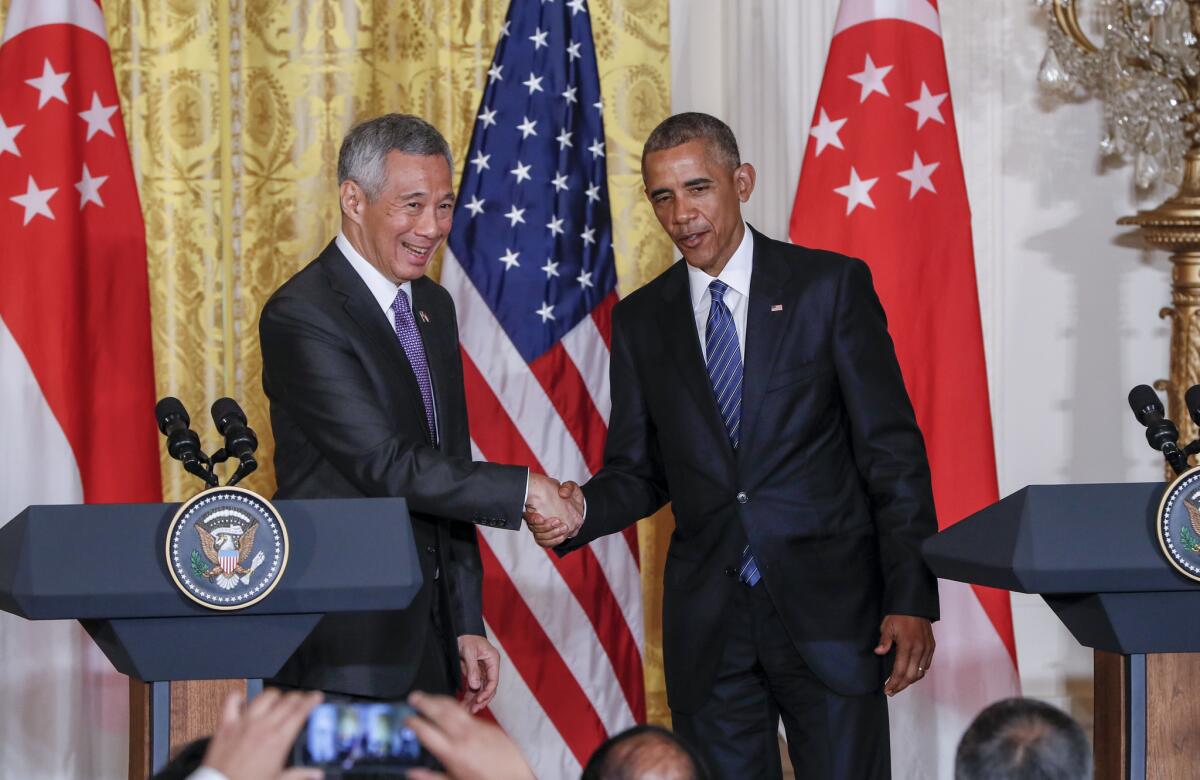Obama on Trans-Pacific trade deal: ‘I remain confident that we can get TPP passed’

- Share via
Reporting from Washington — President Obama expressed fresh optimism Sunday that his sweeping trade pact with Pacific Rim nations would still be approved by Congress, despite widespread political opposition that has left the 12-nation deal all but dead.
Both Democrats and Republicans have soured on the Trans-Pacific Partnership as overseas trade has emerged as a campaign trail scapegoat for all that remains wrong in the shifting U.S. economy. Hopes for passage by the end of Obama’s term have largely faded.
“Look, the politics of trade have always been complicated,” Obama said in an interview with CNN that was recorded before his trip to China and Asia.
Obama noted what he called a “vocal” segment of the Democratic Party, a nod to the popularity of Vermont Sen. Bernie Sanders and the influence of labor union opposition to the deal, as well as the emergence of a new “populist anti-trade sentiment” among some Republicans led by Donald Trump. The two have combined to potentially derail the deal.
But the administration appears unwilling to walk away from the years-long negotiations with its partners from Asia and the other countries without a final push for the Trans-Pacific Partnership, or TPP.
In addition to potential economic benefits from the deal, Obama sees it as a central element of the U.S. effort to counter China’s growing influence in east Asia and the Pacific region.
“The Trans-Pacific Partnership is a historic agreement, cobbled together among a very diverse set of countries, and the basic argument is simple: This is going to be the world’s largest market. And if we’re not setting the rules out there, somebody else is,” Obama said.
“I remain confident that we can get TPP passed.”
The ambitious trade pact was once viewed as a likely capstone to Obama’s second term, a rare chance to find common ground between the two parties, but the election year changed that dynamic.
Even though Congress returns to work this week after its long summer campaign recess, any action in the House or Senate on trade remains nowhere near the top of the agenda. Most lawmakers would prefer to avoid the issue before the November election.
Congress is expected to conduct a post-election lame-duck session, and those final weeks often provide an opportunity for last-ditch legislative maneuvers.
So many issues have been deferred to this year’s lame-duck session that a coalition of conservative groups, particularly those aligned with the billionaire Koch brothers, are trying to stop it altogether.
Obama is on his final Asia trip this week where he intends to reassure global leaders at the G-20 summit in Laos that the U.S. is not backing away from its commitment to the continent.
Twitter: @LisaMascaro
ALSO
Can Clinton turn Georgia from red to blue? It’s a matter of black and white
No more nation of immigrants: Trump plan calls for a major, long-lasting cut in legal entries
Obama makes progress on climate change, the bright spot in his China policy
More to Read
Get the L.A. Times Politics newsletter
Deeply reported insights into legislation, politics and policy from Sacramento, Washington and beyond. In your inbox twice per week.
You may occasionally receive promotional content from the Los Angeles Times.











